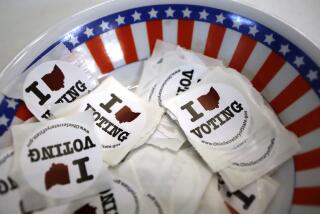What to watch for on election day 2011
The Big One is still 52 weeks away, but the results from a host of local elections today may offer fresh clues about the state of play in politics just as the presidential nominating process is set to begin.
At stake on this “off-year” general election day are a pair of governorships, control of several state legislatures, a slate of local offices and 34 statewide ballot measures on issues such as collective bargaining and abortion.
Here’s a look at some of the day’s high-profile votes.
Ohio Issue 2: Outside of Washington, the biggest political story of the year is the efforts of newly empowered Republicans in a number of battleground states to roll back collective bargaining rights for state employees. Wisconsin Gov. Scott Walker’s successful efforts spurred summer recall elections for state senators. But in Ohio, Democrats and allies in labor collected signatures to put that state’s new law, Senate Bill 5, before voters in a statewide referendum.
Today’s vote on Issue 2 gives the state an opportunity to reaffirm legislation passed by the Republican Legislature and signed by Gov. John Kasich or repeal the law. Supporters say the measure makes overdue reforms to help get government spending under control. The official argument of the opposition is that it risks public safety by making it harder for first responders to negotiate.
An initiative such as this would likely have drawn national interest no matter where the battle was. But the fact that it’s in Ohio -- a key presidential battleground -- makes it the most-watched contest of the night. Democrats and labor, in particular, are taking advantage of the opportunity to test-drive their political machines.
The expectation is that the measure will be repealed, though low turnout in an off-year election and potential confusion over the vote (to repeal requires a “no” vote) could create some suspense after the polls close.
Ohio residents are also voting on Issue 3, which would exempt state residents from a mandate to purchase health insurance. It’s considered a symbolic protest vote against the new national healthcare reforms.
Mississippi Initiative 26: The “Personhood” initiative initially was seen as another test of abortion rights. However, the full wording of the measure as it appears on the ballot -- to define every human being as a person “from the moment of fertilization, cloning or the equivalent thereof” -- has given even staunch abortion foes pause.
“I believe life begins at conception. Unfortunately, this personhood amendment doesn’t say that,” Mississippi Gov. Haley Barbour, a Republican, said in an interview on MSNBC last week. “It says life begins at fertilization, or cloning, or the functional equivalent thereof. That ambiguity is striking a lot of pro-life people here as concerning.”
Opponents of the measure are also warning of other potential consequences, including a ban on many birth control pills and a severe hampering of popular infertility treatments.
Kentucky and Mississippi governor: This year, four states are holding gubernatorial elections, and by day’s end it’s expected that the status quo will continue in terms of party control. Democrat Earl Ray Tomblin won a special election in West Virginia last month to serve out the unexpired term of Joe Manchin, now a U.S. senator. Louisiana Gov. Bobby Jindal won reelection by a a landslide last month.
In Kentucky, Democrat Steve Beshear is expected to also win a second term with ease. Democrats have struggled in the state’s elections for federal office, but local officials have managed to keep distance between themselves and the national party. Republicans had hoped to tie Beshear to President Obama, but their own candidate in the race -- state Senate President David Williams -- ran a bungling campaign.
In Mississippi, Lt. Gov. Phil Bryant is expected to succeed the term-limited Barbour, which would mark the first time Republicans would win three consecutive gubernatorial races in the state since the 1800s. The Democratic nominee is Hattiesburg Mayor Johnny DuPree, who made history by becoming the first major African American nominee for statewide office.
Virginia Legislature: In 2009, Republicans won back the governorship after eight years of Democratic control, and they added six seats to their majority in the House of Delegates. Now, the Republican takeover of state government could be complete if the party can erase Democrats’ 22-18 advantage in the state Senate.
In 2008, of course, Obama became the first Democrat in generations to win the commonwealth’s electoral votes. It’s been one of the states he’s visited most often since becoming president, and one he’s hoping to hold as he seeks reelection. A Republican sweep would bolster the party’s case that the president faces an uphill climb here in 2012.
New Jersey Legislature: Gov. Chris Christie quickly became a national Republican star after defeating Democratic incumbent Jon Corzine in 2009. Today’s vote in the Garden State will test just how potent his political pull is at home as Republicans try to slice Democratic control of both houses of the Legislature.
Christie’s out-of-state fundraising efforts on behalf of his party occasionally raised speculation that he had not ruled out a presidential run. But what those efforts ultimately allowed him to do was fund television ads, in which he starred, on the expensive New York airwaves.
The Democratic margins -- 46-32 in the General Assembly and 24-16 in the Senate -- are likely to be too steep for Republicans to overturn. But the extent to which they are narrowed could add to the legend of Christie -- one that Mitt Romney is tapping into as Christie heads to New Hampshire on his behalf on Wednesday.
Iowa Legislature: There will be just one legislative race on the ballot in the first-in-the-nation caucus state. A Republican victory in a special election for the state Senate would essentially flip control of the chamber. Voters in the 18th District will choose between Democrat Liz Mathis and Republican Cindy Golding. Democrats have a 25-24 edge heading into today’s vote; a 25-25 chamber would give Republican Lt. Gov. Kim Reynolds the tie-breaking vote.
Election law initiatives: Two states -- Mississippi and Maine -- offer the latest test of a Republican drive to tighten election laws. Maine’s Question 1 gives voters the chance to overturn a new law ending same-day voter registration. Mississippi’s Initiative 27 would enact a new requirement that voters provide photo identification at the polls. If passed, Mississippi would become the eighth state with such a law, according to the National Conference of State Legislatures.
More to Read
Sign up for Essential California
The most important California stories and recommendations in your inbox every morning.
You may occasionally receive promotional content from the Los Angeles Times.











